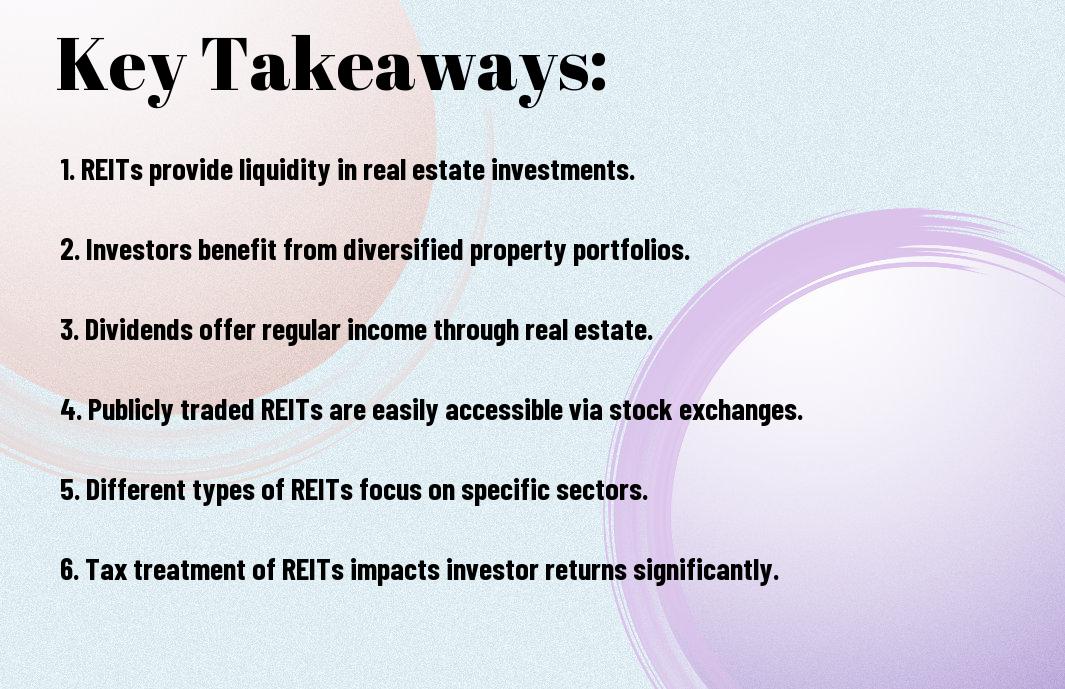With the right knowledge, you can leverage Real Estate Investment Trusts (REITs) to enhance your investment portfolio. This blog post aims to guide you through the fundamental aspects of REITs, including how they operate, the various types available, and the benefits they offer to real estate investors like yourself. By understanding these basics, you can make informed decisions that align with your financial goals and investment strategies.
Key Takeaways:
- Definition of REITs: Real Estate Investment Trusts (REITs) are companies that own, operate, or finance income-producing real estate, allowing investors to invest in real estate without directly owning properties.
- Types of REITs: There are different types of REITs, including equity REITs, which own and operate properties, and mortgage REITs, which provide financing for income-producing real estate.
- Investment Benefits: Investing in REITs provides diversification, liquidity, and potential for income through dividends, making them an attractive option for many real estate investors.

Understanding REITs
Before submerging into the world of Real Estate Investment Trusts (REITs), it’s imperative to familiarize yourself with their fundamental concepts and benefits. Understanding REITs will help you navigate your investment options effectively and refine your strategy in real estate investing.
What is a REIT?
REIT stands for Real Estate Investment Trust, a company that owns, operates, or finances income-producing real estate across a range of property sectors. By pooling funds from multiple investors, REITs provide a way for you to invest in large-scale commercial properties without directly buying or managing the assets.
Types of REITs
Regarding investing in REITs, there are several types to consider. Each type has unique characteristics and investment strategies:
- Equity REITs
- Mortgage REITs
- Hybrid REITs
- Publicly traded REITs
- Private REITs
Knowing the type of REIT that aligns with your investment goals can significantly influence your portfolio’s performance.
| Type of REIT | Description |
|---|---|
| Equity REITs | Invest directly in properties and earn income through rents. |
| Mortgage REITs | Provide financing for income-producing real estate by purchasing or originating mortgages. |
| Hybrid REITs | Combine investment strategies of both equity and mortgage REITs. |
| Publicly traded REITs | Listed on a stock exchange, allowing for liquidity and ease of trading. |
| Private REITs | Not listed on stock exchanges, typically available only to qualified investors. |
In fact, each type of REIT serves a different purpose and can fit various investment strategies. Understanding their differences can help you make informed decisions:
- Focus on income vs. growth
- Risk tolerance
- Investment horizon
- Market conditions
- Sector preferences
Knowing which REITs best suit your investment profile will enhance your real estate investing experience.
Benefits of Investing in REITs
While investing in REITs offers numerous advantages, some of the most appealing benefits include access to diversified real estate portfolios, potential for consistent income, and lower entry costs compared to direct property investment. By adding REITs to your investment strategy, you can enjoy exposure to the real estate market without the complexities involved in owning physical properties.
Diversification
On your investment journey, diversification is key to mitigating risk. Investing in REITs allows you to spread your capital across various real estate sectors, such as residential, commercial, and industrial properties, which can help reduce the impact of market volatility on your overall portfolio.
Passive Income
Above all, one of the major draws of investing in REITs is the potential for generating passive income. By owning shares in a REIT, you can benefit from regular dividend payouts, often more frequent than traditional investments, which can supplement your income and contribute to your financial goals.
Also, REITs are required by law to distribute at least 90% of their taxable income to shareholders in the form of dividends. This structure not only increases the likelihood of receiving steady income but allows you to participate in the performance of income-generating properties without the need for active management. As a result, you can enjoy the benefits of real estate investment while maintaining your primary focus on other pursuits.
Risks Associated with REIT Investments
For any investor considering REITs, it’s important to understand that these investments come with risks that can impact your returns. These risks can vary based on market conditions, property types, and economic factors. By being aware of these potential pitfalls, you can make more informed decisions and better manage your investment portfolio.
Market Risk
An inherent risk in REIT investments is market risk, which refers to the fluctuations in stock prices driven by broader economic trends. The value of your REIT shares can decline regardless of the performance of the underlying properties due to changes in investor sentiment, market conditions, or overall economic stability.
Interest Rate Risk
Against this backdrop, interest rate risk looms large. Rising interest rates can lead to higher borrowing costs for REITs, which can squeeze profit margins and ultimately affect your returns. Additionally, as rates rise, investors may shift their focus to fixed-income securities, leading to declining REIT share prices.
This interest rate risk is particularly relevant when considering that many REITs rely on debt to finance their acquisitions. Higher rates can mean increased costs on existing debt and can deter new investments due to the greater expense. If you’re investing in REITs, watching economic indicators for interest rate changes can help you anticipate shifts in your investment’s performance.
How to Invest in REITs
Not all investors are aware of how to invest in Real Estate Investment Trusts (REITs). To start, you can consider researching Real Estate Investment Trusts (REITs) to find the right options that suit your investment goals. Various types of REITs are available, each with unique features and investment structures.
Publicly Traded REITs
One of the most accessible ways to invest in REITs is through publicly traded options, which you can buy and sell on major stock exchanges like any other stock. This liquidity allows for easy entry and exit, making it a versatile choice for investors looking to participate in real estate without owning properties directly.
Private and Non-Traded REITs
At the other end of the spectrum, private and non-traded REITs offer an alternative path for investors seeking different advantages. These REITs are not available on public exchanges, which means they typically have fewer regulatory requirements and can offer unique investment opportunities.
Plus, investing in private and non-traded REITs often comes with specific characteristics, such as higher fees and longer lock-in periods. They may appeal to you if you’re looking for potential higher yields or diversification within your investment portfolio, but it’s crucial to conduct comprehensive due diligence before committing your funds.
Tax Implications of REIT Investments
Once again, understanding the tax implications of REIT investments is crucial for optimizing your investment strategy. REITs can offer unique tax advantages, but they also come with specific requirements and obligations that can impact your overall tax situation. Familiarizing yourself with these nuances will help you make informed decisions, potentially enhancing your returns.
Tax Treatment of REITs
At the core of REITs’ tax treatment is the requirement that these entities distribute at least 90% of their taxable income to shareholders in the form of dividends. This structure allows REITs to avoid federal income tax at the corporate level, but it also means that you receive dividends that may be taxed as ordinary income.
Impact on Investors
Against the backdrop of dividend taxation, it’s crucial to understand how REIT investments can influence your overall tax situation. While you may benefit from regular income through dividends, the tax treatment can vary based on your marginal tax rate and the classification of those dividends.
Another aspect you should consider is the potential for qualified dividend status, which could reduce your tax burden. If the dividends you receive are classified as qualified dividends, they may be taxed at a lower capital gains rate. Additionally, tax deductions related to depreciation and mortgage interest can further enhance the investment’s attractiveness. It’s wise to consult with a tax professional to navigate these complexities and ensure that your REIT investments are aligned with your broader financial objectives.

Strategies for Successful REIT Investment
Unlike traditional real estate investing, successful REIT investment requires strategic planning and market awareness. You should analyze various sectors, consider the time frame for your investments, and consistently monitor market trends. Diversification can also enhance your portfolio, allowing you to mitigate risks and take advantage of different market conditions. By understanding these strategies, you can position yourself for a more rewarding investment experience in REITs.
Long-Term vs. Short-Term
Around your investment goals, you need to decide whether to adopt a long-term or short-term strategy. Long-term investing in REITs often benefits from compound growth and dividends, while short-term strategies can capitalize on market fluctuations and trends. Your risk tolerance will also play a significant role in this decision, influencing how you approach your investment timeline.
Sector Considerations
Before selecting specific REITs, it’s crucial to evaluate the sectors in which they operate. Each sector, such as residential, commercial, industrial, or healthcare, has its own unique challenges and opportunities.
And, understanding these sector dynamics can help you make more informed decisions. For instance, some sectors may thrive during economic growth, while others may provide stability during downturns. You should consider factors like market demand, geographic location, and demographic trends when analyzing different REIT sectors. Tailoring your investments to align with sectors poised for growth can enhance your overall returns and reduce risks.
To wrap up
The basics of REITs provide you with a valuable investment avenue in real estate without the complexities of direct property ownership. By understanding how REITs operate, their benefits, and their potential risks, you can confidently incorporate them into your investment portfolio. As you explore this sector, keep in mind the importance of thorough research and aligning your investment choices with your financial goals to maximize your returns.
Q: What is a REIT and how does it function?
A: A Real Estate Investment Trust (REIT) is a company that owns, operates, or finances income-producing real estate across various sectors. It provides investors an opportunity to invest in real estate without having to buy property directly. REITs typically generate most of their income from renting spaces and then distribute at least 90% of their taxable income to shareholders in the form of dividends. This structure allows individuals to gain exposure to the real estate market while enjoying the liquidity and accessibility that comes with trading on major stock exchanges.
Q: What types of REITs are available for investors?
A: Investors can choose from several types of REITs, with the main categories being Equity REITs, Mortgage REITs, and Hybrid REITs. Equity REITs invest in and manage income-producing properties, focusing on generating revenue through rental income. Mortgage REITs, on the other hand, provide financing for income-producing real estate by purchasing or originating mortgages and mortgage-backed securities, earning income from the interest. Hybrid REITs combine these two models, engaging in both property ownership and mortgage financing. Each type offers different risk profiles and income potential, catering to varying investment strategies.
Q: What should investors consider before investing in REITs?
A: Before investing in REITs, investors should evaluate several factors, including the type of REIT, the market conditions in areas where the REIT operates, and the management team’s track record. It is important to analyze the REIT’s dividend yield, funds from operations (FFO), and overall financial health to assess stability and future growth potential. Additionally, understanding the tax implications associated with REIT investments, as well as comparing the performance of different REITs with each other and other asset classes, can help in making informed investment choices.

